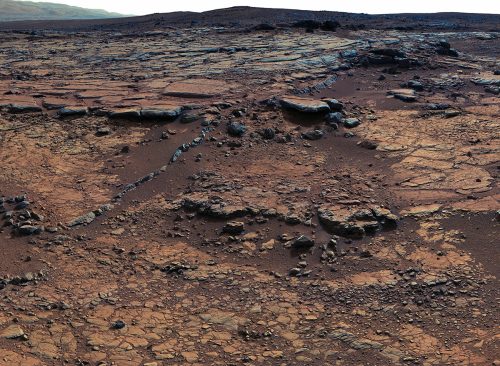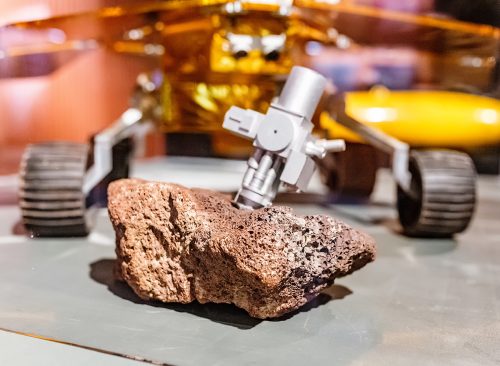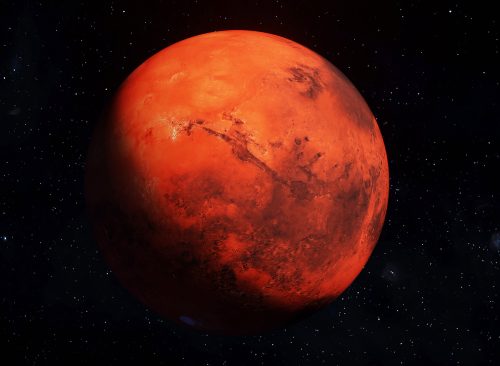Mars Rover Digs up Samples That Hold Life-Friendly Molecules “in Pretty Much Every Rock”’
"Water Was Everywhere!"

NASA’s Mars rover Perseverance has made a discovery that’s exciting scientists: It has found evidence that water may have existed on the Red Planet sometime in the past, and rocks on the surface are laden with organic molecules, the basis of life on Earth. Three studies published this week—one in the journal Science and two in the journal Science Advances—summarize the findings.
“It’s amazing. In pretty much every rock we’re finding organics,” Abigail Allwood, a geologist at the NASA Jet Propulsion Laboratory in Pasadena, which operates the rover and the broader Mars Sample Return mission, told the Washington Post. Read on to find out what the studies found and why scientists are so intrigued.

Perseverance is an unmanned rover that landed in Mars’ Jezero Crater on Feb. 18, 2021. It has been capturing and preserving rock samples to be analyzed by scientists back on Earth. (Getting the rocks back home will require another craft to land on the planet and launch the samples into orbit.) NASA hopes to have the samples on Earth by the early 2030s, the same timeframe they plan to launch a manned mission to Mars.
The rover’s findings have suggested that Mars—now a barren desert planet too arid to sustain life—was likely similar to Earth billions of years ago. Life and water may have once existed on Earth and Mars at the same time, and they might have originated on Mars and spread to Earth via meteorites. Mars may also have significant quantities of water underneath its surface today.

Scientists believe that the Jezero Crater once held water. Because of Perseverance’s findings, “we’ve been able to piece together the complex history of the crater floor,” Briony Horgan, a planetary scientist at Purdue University and co-author on one of the new studies, told Space.com. She added: “Our data confirms that water was everywhere!” The more water found, the more opportunities for life to have existed.

One of the new studies found that rocks in the crater were exposed to water at three different times. “Crucially, conditions in the rock during each time that water migrated through it could have supported small communities of microorganisms,” lead author Michael Tice, a geologist at Texas A&M University, told the Post.
He noted that won’t be conclusive until the samples are analyzed on Earth. Another study surprised geologists: Rocks found by the rover were volcanic, not sedimentary as they assumed. Those volcanic rocks contain organic molecules, supporting previous research that found the basis of life on Mars.

What are those molecules? “Are they merely organics that kind of washed into the system — maybe from meteoritic material that was just part of the water? That would be the least exciting. Or are they little niches of microbial life living in the cavities of these rocks? That would be the most exciting,” Bethany Ehlmann, a planetary scientist at Caltech and co-author of two of the new papers, told the Post.
Perseverance “is collecting an awesome set of samples to reveal Mars’s environmental history in all of its forms — the volcanic history, the history of water, the relationship of organics to those water-rich environments,” she added.
RELATED: The 10 Most “OMG” Science Discoveries of 2022

A major objective of Perseverance’s explorations is to determine what happened on Mars that turned it from wet and warm to frigid and uninhabitable. Here, too, the volcanic rocks found by the rover may hold clues. Specifically, scientists hope to determine why Mars lacks a global magnetic field like the Earth’s—which helps protect the atmosphere from the sun’s heat—and plate tectonics, the process by which the Earth’s crust moves and regenerates itself, stimulating volcanic eruptions. At some point, Mars lost its magnetic field and its atmosphere.
“On balance, we are actually super lucky that there are igneous rocks in the crater, and that we happened to land right on them, since they are ideal for determining ages and studying the past history of Mars’ magnetic field,” Benjamin Weiss, a planetary scientist at MIT and co-author of two of the papers, told the Post.














